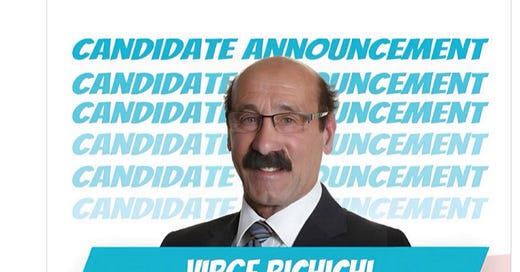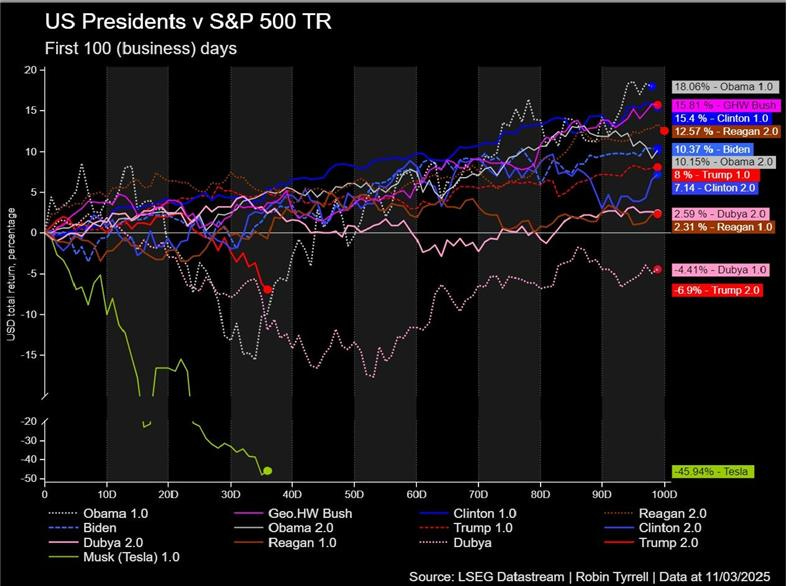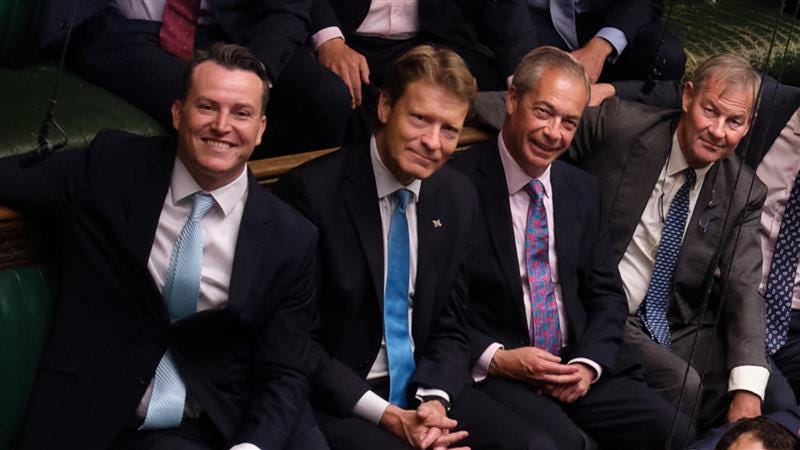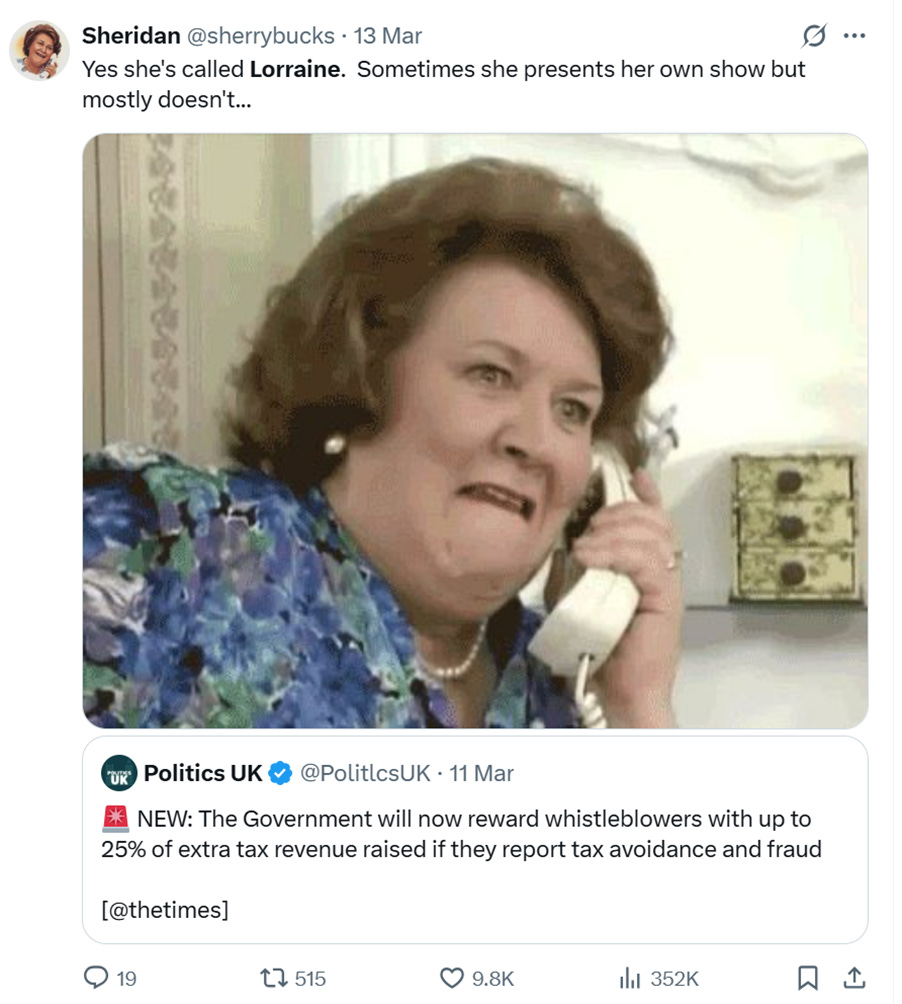Borkowski Media Trends: Spotify, Trump Tariffs & MORE
PLUS: Reform Troubles & Where is 'Where is Lorraine'?
Pimping Woes: Spotify gets caught in the Tate takedown
Despite alleged support from the White House in securing the removal of the 3 year travel ban, the Tate brothers (who face charges of human trafficking and rape) have found themselves partially ejected from Spotify. The move follows Spotify facing a significant backlash for hosting content from Andrew Tate, particularly his “pimping hoes” podcast. The episode in question has faced huge criticism for expressing misogynistic views and espousing harmful behaviour towards women.
Spotify faced a mountain of complaints from both users and staff, along with a petition that garnered over 92,000 signatures calling for the content’s removal. Employees were outspoken, with one widely quoted comment calling the decision to host the content “pretty vile”. Despite the obvious pressure to cancel Tate, a Spotify spokesperson has stated that “the content in question was removed because it violated our policies, not because of employee discussion” and other Tate content remains available.
Far from shutting down the controversy, Spotify’s inconsistent actions have resulted in further criticism. Whilst the company has tried to justify actions with its content policy which does not remove content based upon an artist’s behaviour outside of the platform, its rules do bar content which makes ‘dehumanising statements’ about a person or group based on protected characteristics. Public backlash has continued and there is a petition urging Spotify to remove all of Tate’s content.
Trust in the platform’s integrity was further called into question with the release of its Loud & Clear Report which touted a record $10bn in royalty payouts, framing the success as evidence of the platform’s democratisation of music access. In reality, only a tiny fraction of artists are thriving, with only 4.4.% earning over $131,000/annum. Accused of trying to spin the numbers, it is clear that public trust in Spotify is plummeting, however its chokehold over access to music streaming is such that its profit might still be protected.
Tariffs not the Trump Card Donald hoped for…
President Trump’s economic protectionism has been in overdrive since he returned to the White House in January. In the very early days it looked like his constant threat of tariffs to try to strong-arm countries that were traditionally firm US allies into more favourable trade deals might have some short term success.
We can’t comment on the economic robustness of this strategy but, from a purely communications point-of-view (and per the Trump playbook, an element of its rationale must have been the publicity he and his team knew it would drive) it’s all starting to look like one big stunt.
And like any stunt not grounded in substance, it’s beginning to unravel.
Firstly Canada, enraged by Trumps expansionist ‘51st State’ rhetoric, and with an economist newly installed as Prime Minister, retaliated firmly enough against Trump’s tariffs that he was forced to wind back on his most extreme threats.
Then, the Stock Markets crashed. So much for the art of the deal.
Then, amid rising tension with the EU, centring on alcohol imports (with an odd sideline in attacking Ireland’s corporation tax policy), news emerged today of a growing movement to boycott American products on the continent.
Then Foxconn, one of the biggest electronics manufacturers for the world’s Tech Giants, increasingly a key component of Trump’s support and power base, described the tariff policy as a “big headache”: a splinter in the so-far united front of Tech Bro diplomacy?
Perhaps even more than that, because finally, Tesla, the jewel in the crown of Trump’s Tech Bro in Chief Elon Musk’s business empire, released an unsigned letter (of which most commentators agree Musk must have had prior knowledge) warning of the policies’ “disproportionate impact”.
Rhetoric is Trump’s chief weapon, and his clear hope was that his fraternity would back his controversial tactics to the hilt, and that his PR bark would be loud enough that his trade partners would be too scared to test his economic bite. That hasn’t worked, and the next few weeks will be a telling test of the substance underlying the noise of the tariff gambit.
Bruising week for Reform
Despite securing only five seats in the 2024 general election, Reform UK has gradually built poll momentum against a hapless Tory party and shaky Labour government under Starmer thanks to populist MPs like Nigel Farage, Rupert Lowe, and Lee Anderson.
However recent internal conflicts between Lowe and party leader Farage have led to a week-long drama that has undermined much of the party's progress. While many within Reform's leadership are downplaying the saga, these fault lines could cause a split within the party. So what happened?
The Lowe/Farage relationship has been tumultuous ever since Lowe chose to stand as a UKIP candidate in 2019, raising concerns about splitting the Tory vote. Fast forward to 2024: Farage and Richard Tice were desperately seeking viable candidates, and few seemed more suitable than Lowe. While their relationship held for several months, recent tensions escalated when Lowe publicly criticised Farage's leadership style. This led to Reform UK suspending Lowe and reporting him to the Met Police, alleging threats against party chairman Zia Yusuf.
While Farage is undeniably the party's most recognisable figure, Lowe has been cultivating his own following, mainly through his savvy use of X/Twitter. His regular posts, which resonate with the 'common sense' approach attracting many to the party, have been a standout success. However, a recent JL Partners poll indicates that 86% of the public failed to recognise Rupert Lowe, highlighting the considerable work Reform UK still faces in expanding its relevance.
If that wasn’t enough drama for one week, the party’s ex Welsh Leader Nathan Gill is set to stand trial for taking bribes to make statements beneficial to Russia in the European Parliament.
The icing on the cake was a local authority candidate who went viral because people thought he was made up.
Although Reform UK may recover, they've lost a key asset. With over four years until the next general election, Lowe had ample time to solidify his position as a Reform leader on the UK's political stage. This recent saga has set the party back, and with Starmer gaining momentum on the world stage, the outlook for Reform UK appears unconvincing.
Where’s ‘Where Is Lorraine’, Lorraine?
Hot on the book publicity trail UK television icon Lorraine Kelly gave an interview to the Guardian’s Simon Hattenstone in which, true to his style of amicably taking celebrities off the beaten track of their messaging and into their place in wider popular culture, the interviewer asked her about the X account ‘Where is Lorraine’ which documents the presenter’s attendance record on her eponymous show.
To the journalist’s surprise, Lorraine is not a fan of Where Is Lorraine?, prompting the account admin to shut the whole operation down on seeing the article.
But it ended up being at best a bit of a Pyrrhic victory for the presenter as the new week dawned with an outpouring of love and sympathy for the light-hearted account and vitriol towards Lorraine herself for her supposed inability to take a joke. It also precipitated a mini-Streisand effect in drawing disproportionate attention to Lorraine’s frequent absences from her own show.
Where Is Lorraine’s demise trended on X for much of Monday and even generated a few headlines of its own before the meme frenzy simmered.
And things only went from bad to worse when a government policy to reward tax evasion whistleblowers was announced. A side-effect of the original Guardian story was that it also dredged up Lorraine’s fight against HMRC to be recognised as a freelance worker in order to avoid paying a tax bill, which she eventually won with her lawyers having argued that she is a performer who plays a character on television much to the amusement of the internet at the time. The two memes combined into an explosion of further Lorraine-based jokes just in time for a copycat Where Is Lorraine? account to suddenly resume the work of its defunct predecessor.
The lesson here is simple: a long-running meme or joke about a celebrity is a many headed beast ill-disposed towards any who would try to tame her. And like the Hydra, when you get rid of one online assailant, two nastier ones suddenly pop out of the abyss. Lorraine didn’t call for Where Is Lorraine to be shut down, but in showing that it affected her, she’s unwittingly given the joke more power.









